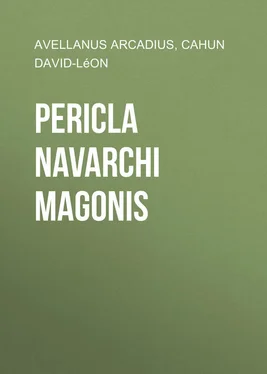Arcadius Avellanus - Pericla Navarchi Magonis
Здесь есть возможность читать онлайн «Arcadius Avellanus - Pericla Navarchi Magonis» — ознакомительный отрывок электронной книги совершенно бесплатно, а после прочтения отрывка купить полную версию. В некоторых случаях можно слушать аудио, скачать через торрент в формате fb2 и присутствует краткое содержание. Жанр: foreign_antique, foreign_prose, на латинском языке. Описание произведения, (предисловие) а так же отзывы посетителей доступны на портале библиотеки ЛибКат.
- Название:Pericla Navarchi Magonis
- Автор:
- Жанр:
- Год:неизвестен
- ISBN:нет данных
- Рейтинг книги:3 / 5. Голосов: 1
-
Избранное:Добавить в избранное
- Отзывы:
-
Ваша оценка:
- 60
- 1
- 2
- 3
- 4
- 5
Pericla Navarchi Magonis: краткое содержание, описание и аннотация
Предлагаем к чтению аннотацию, описание, краткое содержание или предисловие (зависит от того, что написал сам автор книги «Pericla Navarchi Magonis»). Если вы не нашли необходимую информацию о книге — напишите в комментариях, мы постараемся отыскать её.
Pericla Navarchi Magonis — читать онлайн ознакомительный отрывок
Ниже представлен текст книги, разбитый по страницам. Система сохранения места последней прочитанной страницы, позволяет с удобством читать онлайн бесплатно книгу «Pericla Navarchi Magonis», без необходимости каждый раз заново искать на чём Вы остановились. Поставьте закладку, и сможете в любой момент перейти на страницу, на которой закончили чтение.
Интервал:
Закладка:
Léon Cahun
Pericla Navarchi Magonis / sive Expeditio Phoenicia Annis Ante Christum Mille
INTRODUCTION
The easiest way to learn a language is by its use and in this respect Latin is like other languages, – it should be studied with use, and used with study. In teaching Latin, however, schools follow no such simple methods. Latin is taught with hardly any effort at its use and in most cases with no effort to add to the classical text any reading in Latin which would attract the interest of the young and which they could take up out of class for its own sake. The student begins by committing to memory the many forms and rules of an inflected language – no small task to undertake at the age of twelve or thirteen years, – and through this laborious drudgery is introduced to a small amount of text selected from Cæsar, Nepos, Sallust, Cicero and Virgil – excellent texts for the class-room, but not likely to be read at home for pleasure, except by those children, if such there be, who find entertainment out of school in reading Webster, Burke and Milton.
For children who like fairy stories and romance, who like to read of sea-fights and adventure, this account of "The Adventures of Captain Mago" has been translated into excellent Latin by Dr. Arcadius Avellanus, and my advice to those who take the book up, is – don't turn the reading into work. The Latin is not very difficult. Some of the descriptions may not be easy, but descriptions can be passed over and the action is not hard to follow. After reading a few pages in this manner you will be surprised to find that the book can be read for the sake of the story; go a little further and forms and rules which were hard to learn from the grammar will have concrete meaning and a familiar air. Long before the end you will like Latin and will begin to find class-room work much easier.
This book is one of several stories which Dr. Avellanus has translated into Latin and which in their manuscript form have together been called the Mount Hope Classics. One of the short stories in this series, Mr. Ruskin's "King of the Golden River" was recently published in pamphlet form under the title "Rex Aurei Rivi" and met with such demand that the small edition was soon exhausted. The present volume which is the first book to be published from the Mount Hope Classics is printed primarily for my own children, but a somewhat larger edition has been published than was ventured when Rex Aurei Rivi was printed, and while this edition holds out copies may be purchased at the address given below.
37 Wall Street, New York City
E. Parmalee Prentice
PRÆFATIO AUCTORIS
Paginæ hicce secuturæ nihil sibi novi, nihil eruditæ disquisitionis, vindicant. Solum earum atque unicum propositum est, imaginem priscorum temporum, ut mundus mille ante Christianum ævum annis exstiterat, adumbrare, popularique, præsertim pro iuventute, sermone summam exhibere notitiarum, rerumque multifariarum, quæ nobis in libris passim obviam fiunt, qui libri, partim propter caritatem pretii, partim propter rationem abstrusam ac doctam narrationis, plerisque haud patent.
Verendum mihi erat, ne si paginas fictæ huius narrationis, quippe cuius solum propositum est doctrinam iucunde impertiri, effusis notis onerarem, totum opus obruerem: licet hic tamen semel memorare, omnia, quæ hic historiam Phœnicum respiciunt, ex uno alterove opere auctorum, a me consultorum, amplissimis argumentis suffulciri posse.
Præcipuorum huius generis auctorum, operumque eorum elenchum hicce subiungo:
1. F. C. Movers , Das Phönizische Alterthum.
2. E. Renan , Mission in Phénicie.
3. Daux , Recherches sur les Emporia phéniciens dans le Zeugis et le Byzacium.
4. Nathan Davis , Carthage and her Remains.
5. Wilkinson , Manners and Customs of Ancient Egyptians.
6. Hoeckh , Kreta.
7. Grote , History of Greece.
8. Mommsen , Geschichte der Römischen Republik (Introductio, et Cap. I).
9. Bourguignat , Monuments mégalithiques du Nord de l'Afrique.
10. Fergusson , Rude Stone Monuments.
11. Broca , atque A. Bertrand , Celtes, Gaulois et Francs.
12. Abbé Bargès , Interpretation d'une Inscription phénicienne trouvée à Marseille.
13. Layard , Nineveh and its Remains.
14. Botta , Fouilles de Babylone.
15. Reuss , New translation of the Bible.
Denique paucæ notæ ad calcem adiectæ sunt, 1 1 Has notas ista in editione prætermittere, iisque ad textum illustrandum novas sufficere, visum interpreti est.
e quibus palam esse potest, quid per totum opus fieri potuisset. Appendicem item subnexi sub finem operis, quæ saltem obscuriores passim res illustrent, quas narratio perpetua quodammodo obscuriores reddidit.
CAPUT I
Quamobrem Bodmilcar, nauta Tyrius, Hannonem, scribam Sidonium, oderit
Navarchus Mago 2 2 Nomen viri; vide notam 1 in fine libri.
ego sum, meque artis navigandi peritissimum esse, Hiram, 3 3 Regnavit Tyri ab anno 980, ad an. 947 ante Christum; vide n. 2.
Rex Tyriorum, 4 4 De Tyriis; v. n. 3.
probè intellexit. Tertio itaque regni sui anno evenit, ut Sidone, 5 5 Urbs maxima, et caput Phœnices; v. n. 4.
oppido piscatorum, capiteque Phœnicum, 6 6 Canaanitæ, vicini Palæstinæ; v. n. 5.
ad se in regiam, colloquendi causà, me evocaverit. Nimirum de meis longinquis peregrinationibus iam antea certior factus, rite cognovit quemadmodum Melitam 7 7 Malta; v. n. 6.
viserim, quemadmodum ad Byrsam 8 8 Arx Carthaginis; v. n. 7.
usque negotia factitaverim, quod quidem oppidum, a Sidoniis conditum, nunc tamen a Tyriis Carthadas 9 9 Carthago; v. n. 8.
appellatur; ac, denique, quemadmodum ad dissitissimas Gades 10 10 Cadiz, in Hispania; v. n. 9.
, in regione Tartessiorum, 11 11 Insula Hispaniæ; v. n. 10.
pervenerim.
At lapsu temporis sol gloriæ Sidoniorum inclinare, fortunæque recedere cœperunt. Dum enim Tyriorum navigia longè latèque maria in suam redegerunt potestatem, mercatores eorundem terras quaquaversum peragraverunt. Enimverò Tyriis placuit regem sibi creare, qui per suffetes, 12 12 Consules; n. 11.
vices eius agentes, cætera Phœnicum oppida sibi subegit. Sic igitur fortunæ Tyriorum in diem augescere cœperunt, unde factum est, ut nautæ, mercatoresque ex oppidis Sidon, Gebal, Arvad, atque Byblo, 13 13 Nomina oppidorum; n. 12.
Tyrum confluerent, ibique suis cœtibus, mercatorumque collegiis, iam tum summa potestate pollentibus, societate se iungerent.
Quum ego itaque Regi Hiram obsequii præsto officia, ipse me edocet, amico et socio suo Davidi, Regi Iudæorum, in votis esse, ad condendum Deo suo Adonai 14 14 Domino; n. 13.
templum, materiam undique comparare, Hierosolymaque, 15 15 Urbs in Palæstina; n. 14.
urbem suam, convectari curare, sibi vero in animo esse, regiá munificentiá ad molimentum omnem opem atque operam conferre. Proinde, Rex suadet mihi, ut suis sumptibus, aptam classem comparem, iter Tartessum suscipiam, copiam argenti, aliaque quælibet rara, pretiosaque eius regionis producta conquiram, quæ ad templum illud adornandum sumptuosissima, et maxime accommodata esse videantur.
Quandoquidem desiderio revisendæ Tartessi, regionumque Occidui utique perquam ardebam, propositum Regis peravide amplector, eumque certiorem reddo, non plus temporis me mihi sumpturum quam quod ad comparandam, instruendamque classem, et ad conducendas operas, 16 16 Laboratores.
sufficere iudicavero.
Интервал:
Закладка:
Похожие книги на «Pericla Navarchi Magonis»
Представляем Вашему вниманию похожие книги на «Pericla Navarchi Magonis» списком для выбора. Мы отобрали схожую по названию и смыслу литературу в надежде предоставить читателям больше вариантов отыскать новые, интересные, ещё непрочитанные произведения.
Обсуждение, отзывы о книге «Pericla Navarchi Magonis» и просто собственные мнения читателей. Оставьте ваши комментарии, напишите, что Вы думаете о произведении, его смысле или главных героях. Укажите что конкретно понравилось, а что нет, и почему Вы так считаете.












